Notes from visiting the WWII museum on Veterans Day
On the end of a long road trip through the southeast, I spent yesterday at the WWII museum in New Orleans. I didn’t even know we had a museum for this war, and was surprised to discover it’s not in Washington D.C. The museum is located in New Orleans in part because the Higgins boat was invented there: it’s the amphibious vehicle used for the D-Day invasion at Normandy.
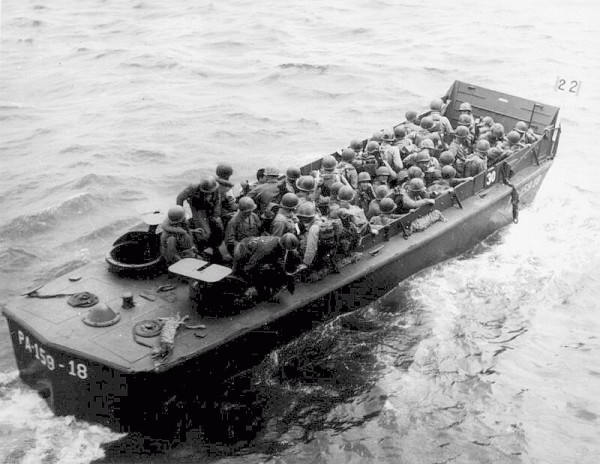
The museum itself, I’m sad to say, is one of the more confusing museums I’ve ever been to, with exhibits divided over several buildings, and not ordered in any obvious fashion (like say, chronological). There is an amazing and powerful story told here, but the overall experience is disorienting and it’s easy to get lost or go the wrong way through some exhibits. The Final Mission: USS Tang experience exhibit is the worst of the bunch, an under designed and barely interactive experience “simulating” the last mission of the U.S. submarine Tang, the most honored and successful submarine of the war.
I’m glad they chose to tell this story, as it’s a heroic and tragic tale, but it’s poorly told and a film would have been far more engaging than the underwhelming simulation they provided (I had to read about the last mission online to understand what the simulation was trying to explain. The Tang sank after being hit by it’s own stray torpedo).
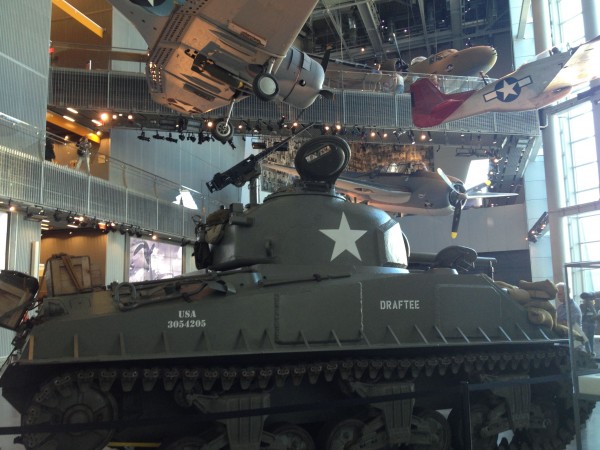
The offering with top billing is the 4D experience Beyond All Boundaries, narrated by Tom Hanks with many famous actors in voice only roles, a 20 minute summation of the entire war. It’s well done and comprehensive, establishing how the fate of the world was at stake in this war, something that has not been true for any war since (despite the endless fearmongering of every war the U.S. has entered or caused since). The story told has an unsurprising focus on American’s role in the war, which is certainly important and worth in many ways, but there’s very little mention of the Soviet Union’s major, and possibly larger, contribution to victory. The U.S. lost 600,000 people in WWII, the Soviet Union lost nearly 20 million. I visited the WWII museum in Kiev, Ukraine in 2009 and was fascinated by the comparisons and contrasts to U.S. tellings of the same war it provoked.
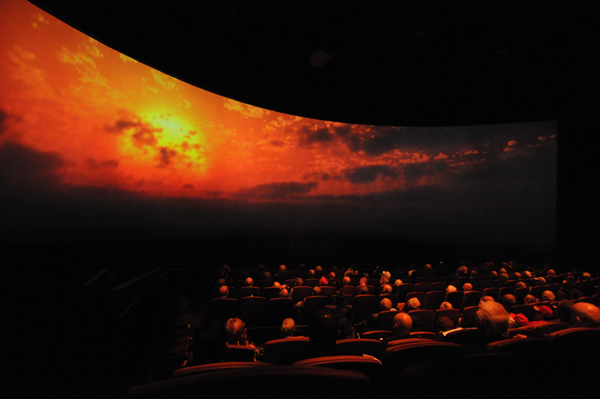
My favorite exhibit, perhaps because I learned the most new insights from it, was Manufacturing Victory. The central argument it makes is the primary reason we won, and were even able to put up a fight, in WWII was the transformation from the U.S, with only the 18th largest army in the world in 1937, into a major military production power. Without guns, tanks, boats and planes to fight, the war would have been over before it began. One of the displays in the museum showed the relative size of the armed forces of Japan, Germany and the U.S. (shown below) early in the war. We were an isolationist and peaceful country with few ambitions for world power.
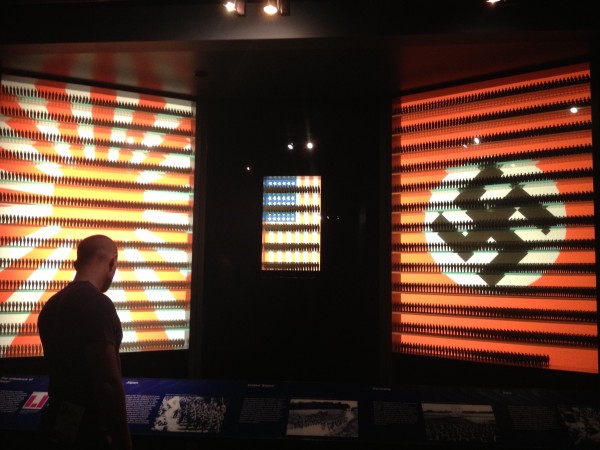
General George Marshall is the hero of the exhibit. He pushed his way into a conversation with FDR, convincing him the U.S. was woefully underprepared and needed to make radical changes to protect itself, much less win the war. His persistence led to the plans that made co-operation between government and business possible. Ford converted car plants to make warplanes, Motorola made the walkie-talkies used in WWII and dozens of other companies shifted their production from consumer goods to war goods. The exhibit details just how many people and organizations contributed. There are so many untold stories in just this one aspect of what was involved in winning the war.
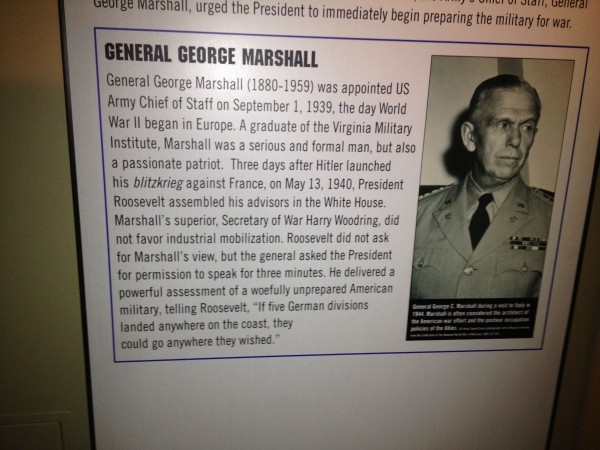
It was also made clear how every American was asked to help with the war effort. It wasn’t just the existence of the draft which gave most Americans a personal connection to the war (something we’ve lost in our wars since abolishing the draft). There was a kind of civic pride and patriotism that’s rare today about making sacrifices for the nation. Shortages of rubber and copper meant citizens were asked to donate the supplies they had, and many items, like food cans, were recycled for the war effort. Unlike being told our duty is to consume, it was made clear that every American should take pride in sacrifice for the greater good and helping with the national effort.
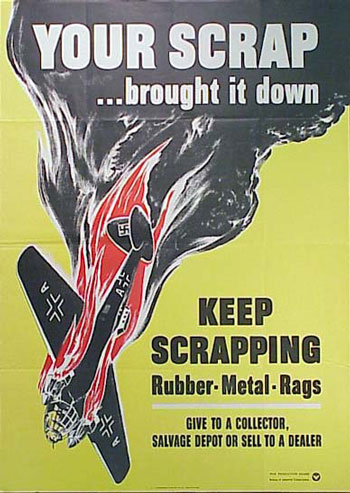
In a way the massive armada at D-Day, one of the largest every assembled in history, was the output of the collective effort of an entire nation. Britain and Canada made similar sacrifices and contributions (and of course it was England that had the strength to remain the last free country in Europe, fighting for years before America entered the war). Even during the revolutionary war American citizens were largely divided and there’s an argument to be made that WWII had more support from its citizens than any war fought before or since.
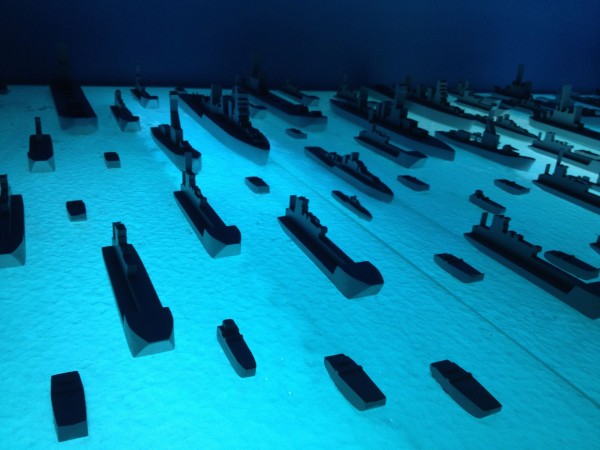
The carnage at D-Day, and during the war, is explained in graphic detailed at the museum. The prolonged end of the war was horrible on so many levels, and even more futile and pointless, than the heart of the war itself. It’s hard not to feel something deep and sad about how many people lost their lives during the war and how much pain and suffering the entire endeavor caused for everyone involved.
Over 60 million people died during WWII, nearly 2.5% of the entire population of the planet at the time. The entire idea of war seems so foolish and futile, yet we continually find ourselves stumbling backwards into more of them.
For Veterans day my thoughts are with everyone who has volunteered their time and service for a greater good. I just wish those sacrifices could be made in ways that weren’t in opposition to other nations. I hope for a day when the lessons form the past are so broadly and deeply understood, that few people ever have to die or suffer again for so little gain. I feel tremendous respect towards everyone who serves their communities, and only wish more of our sense of service was directed at civic, peaceful endeavors, a thought that weighed heavily on my mind as I left the museum.

Hey Scott, lovely read.
I recently finished reading James Michener’s Poland and was surprised to read about how the war ended for the Polish and the Ukrainians must sooner than it did for the rest of Europe and the world, thanks to USSR’s push from the East.
Your experience at the WWII museum in Ukraine seems to point towards the same fact. I’d love it if you could do an article on the comparison between the two stories. It would be interesting to see how the Soviet Union’s contribution is portrayed differently from the US’ contribution. That is, if you still remember the details of that visit.
Thanks. I’m no history expert and I bet we can find a book or paper on that very subject.
The shortest summation was that they were both inverses of each other – many of the facts shared were the same but the emphasis in both countries was to focus on whatever the ‘local’ country did. I’m sure there is tremendous pressure in any nation to have its museums tell the most favorable story of the many possible ones that could be told.
It was a good lesson in how we have to study multiple perspectives on anything to have any chance at sorting out the truth.
Thanks for sharing that. I guess I will go on a hunt for such writing. Should make for excellent analysis…
Indeed, lovely reminder that even in victory, there are many sides to the story and we should try to look at them all.
I’d just like to second your sentiments, so eloquently expressed in the last paragraph. Thanks, Scott.
Although General Marshal was not famous, because he never went overseas, I think management guru Peter Drucker thought he was the best U.S. general. Drucker pointed out that part of the reason Hitler declared war on the U.S., after Pearl, was that Hitler couldn’t believe the U.S. would master grinding optical lenses, not on a mass production basis. I once found a war time Reader’s Digest that contained an article on the U.S. learning to make lenses. As for Drucker, he once mentioned a man at general motors in he postwar years who was conscience stricken that he could only get black woman factory jobs, making lenses, during wartime and not in peacetime.
Thanks Sean for making a connection between Marshall and Drucker.
Beautiful post, Scott. I will make a point of going to the museum next time I’m in New Orleans.
My dad was a WWII vet and was involved with the Russian linkup at the Elbe. If you’re curious, you can read a bit about at this blog I recently came across http://bit.ly/1u25poR . I’m in the process of scanning and memorializing newspapers articles from the time.
The most relevant part on my dad’s experience is under the “Oath of the Elbe” section. I have newspaper clippings from the time when my dad tore up the oath. I remember him being so angry about the Cold War. He felt the “people” had fought so hard for something they believed in, but the governments had less noble goals.
In the years before he died he did some TV appearances and was interviewed by Studs Terkel. I’m glad that before he died he came to see that what he did was important, even if he the governments let him down.
Thanks Nancy for adding a personal story. I don’t have any relatives that served in the U.S.
The history of the reasons for war and what happens after war not matching each other is as old as war itself I’m afraid.
On my blog on Remembrance Day (Canadian Veterans Day) I was telling a commenter about telling the folks at work that it was baffling how the U.S. newspapers kept implying that the Iraqi regular army needed more training by the U.S. army. Nuts! A soldier’s role is not to slay but to be slain. Just as a low morale corporation has people saying, “I only work here” so too do the soldiers feel no responsibility to die for a corrupt government and (it inevitably follows) a corrupt uncaring headquarters.
I am baffled that U.S. citizens don’t understand this, after the super-plain lesson of Vietnam. I wonder if a mental block against learning any Nam lessons has affected your ability to learn in other places?
I remember speaking up in college, a few years after the U.S. declared war on drugs, that the drug war was a farce. Turns out my department head had been sitting beside the Toronto police chief, at a conference, and he had told her that too, using the very word, farce. I knew the war was a farce because, besides keeping my ear to the ground, I knew the U.S would repeat the same sorry list of lessons not-learned in Nam. At the time I thought it was -ahem- the U.S. character, (you guys have a reputation) but now I’m wondering if Americans have “denial” or some sort of block.
Plenty of U.S. citizens get it. I’m wondering if Canadians have some sort of denial about that :)
That is nice to hear, Nancy, thank you for sharing. I can’t judge Canadians since nearly all the folks I know are nonpolitical, and not the sort to, say, read Scott’s blog.
I can say that a bright fellow from Africa was mixed up as to the dates of the world wars. Some Africans from different countries at my table pointed out that we (in North America) can commemorate Nov 11 because our wars are external, whereas African wars have been internal.
I think it was very wise, by world standards, of the U.S. south to reframe the civil war as “a gallant lost cause” so everyone could get on with things.
Balance, in journalism, means avoiding editorializing by presenting both sides and letting the reader decide, even when the “right side” is obvious to the reporter.
For example, for a story on a proposed irrigation dam, even if everyone excitedly agrees, there should be at least one nature-lover or or professor of soil (salt leaching) who disagrees.
(Of course war-time, by definition, means we abandon balance “for the duration”)
For Iraq, there could always be an historian or veteran quoted, in order to balance the army’s quote that more training is the solution.